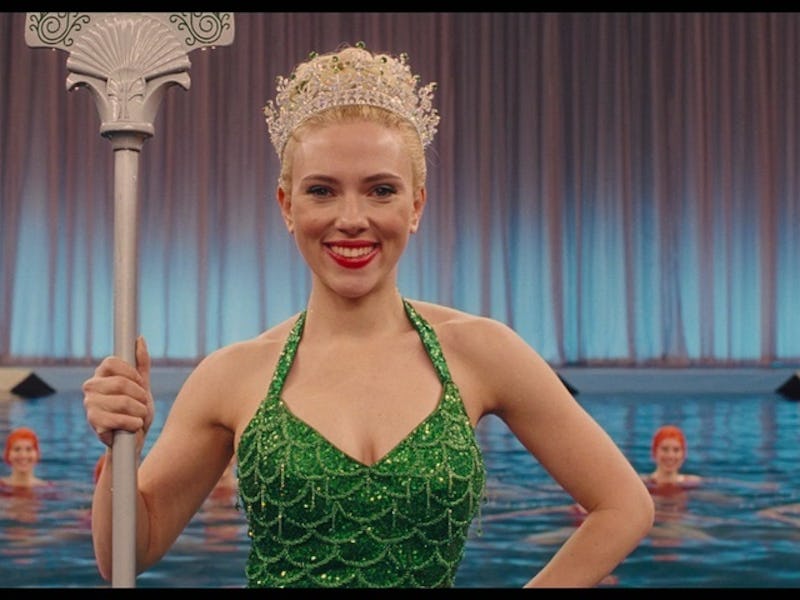'Hail, Caesar!' Makes Nostalgia Subversive by Feeding Us Old Hollywood Poison
And that's OK. No, wait, that's fantastic!

The undercurrent of nostalgia running through Hail, Caesar! may be the most subversive thing about the Coen brothers’ latest tilt at mass market absurdism. It’s not the text of the story, which dunks 1950s Hollywood in a cocktail heavy on irony and black humor, but in the visuals. Over the course of the film, the Coens set up multiple extended set pieces, the sort of grand extravagant costumed orchestrated spectacles that Hollywood just doesn’t do anymore. They’re kin to The Big Lebowski’s dream sequence, but they’re not dreams. They’re scenes in the imaginary films the Coens dreamed up for Hail, Caesar!, and they serve as a weird reminder that a totally unfair, racist, chauvinist machine put out some great product.
The most delightfully ostentatious of these is the scene where Scarlett Johansson’s character, DeeAnna Moran, is introduced. It’s a grand aquatic ballet, with synchronized swimming, Johansson in an ill-filling mermaid costume, a live orchestra, and a hilariously old-fashioned animatronic whale. The entire scene, punchline aside, feels like a mash note to the glorious excess of old-time Hollywood and that great impulse to put on a show today’s Hollywood execs seem to have internalized.
Still, as glorious as Johansson’s visual introduction may be, it’s almost immediately undercut by her verbal introduction. She’s pregnant, and the film’s main character — Josh Brolin’s Eddie Mannix — is there to act as a studio fixer and ensure that the studio and DeeAnna’s reputation remain intact and family-friendly. And so Brolin and Johansson discuss her two disreputable ex-husbands and try to figure out a way to allow the pregnancy to proceed.
To be fair to Mannix and the film’s portrayal of the studio, he does seem to want the best possible option for both the actress and the studio. And yet the discussion — involving adoption, who the father might be, and potential scandals — serves as a direct reference to some of Hollywood’s greatest scandals, most notably the date rape of Loretta Young by Clark Gable and the “solution” of Young adopting her own child. (Gable’s rumored checkered past is referenced again later, with discussion of a Hollywood star who killed a pedestrian while drunk driving.)
This isn’t merely a one-off, either. Hail, Caesar! does it again later, creating an all-time great dance sequence, then attaching that scene specifically to the characters and storylines directly referencing the Hollywood communist blacklisting, another massive black eye on the industry’s supposedly glorious history. The film generally feels thoroughly uncertain about how it and its characters should feel about Hollywood.
Channing Tatum's goddamn dance sequence in 'Hail, Caesar!' is an all-timer.
And yet … normally this would be a bad thing. You’d want a movie that manages successfully to have a point of view, to satirize or defend the worst and best. But this is the Coens. They don’t do that. They avoid having simplistic political points of view. They create deliberately hilarious/vicious messes, which actively resist easy conclusions, let alone stories of good versus evil. Hail, Caesar! complicates this in some respects, as it does have an easy ending. But that ending isn’t clearly on the right side or wrong side of an easy hot take — and the rest of the film goes along with this. Just like The Big Lebowski, just like No Country for Old Men, just like the majority of the Coens’ filmography, there isn’t a simple takeaway.
That lack of resolution is great for Hail, Caesar!, a comedy in the Lebowski vein that offers both immediate laughs and potential depth. Does that mean it’s as great as The Big Lebowski, a film that’s both a massive cult hit and thoroughly underrated? Perhaps not, but as with most of the Coens’ best, the work exists on a knife edge between comedy and tragedy, or in this case, between historical celebration or damnation.
Hail, Caesar! glorifies and satirizes at the same time, and even better, it never feels wrong for doing so. It will be fascinating to observe what happens to this film next.